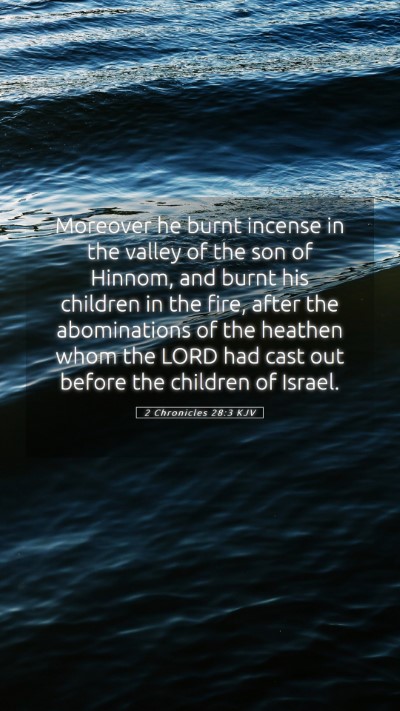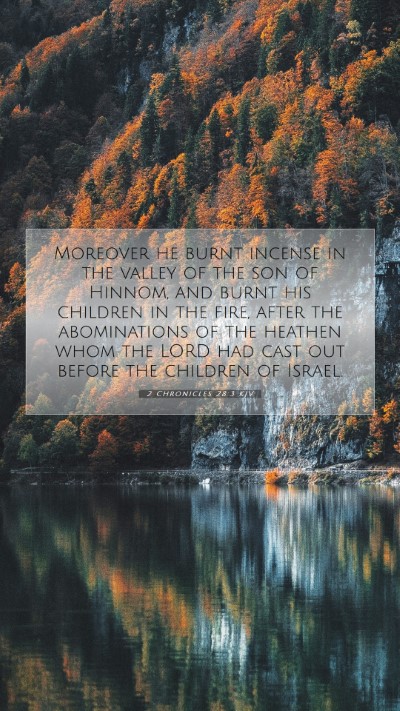Bible Verse Meaning: 2 Chronicles 28:3
The verse 2 Chronicles 28:3 states, "Moreover he burnt incense in the valley of the son of Hinnom, and burnt his children in the fire, after the abominations of the heathen whom the Lord cast out before the children of Israel." This verse provides a somber insight into the reign of Ahaz, King of Judah, illustrating the extent of his idolatry and moral depravity.
Summary of the Verse
This passage reveals the abhorrent practices of child sacrifice that Ahaz engaged in, which were influenced by the pagan customs of surrounding nations. Such acts were not only a violation of the covenant with God but also a direct affront to the sacredness of life and worship.
Insights from Commentaries
-
Matthew Henry's Commentary:
Matthew Henry emphasizes that Ahaz's actions were driven by a spirit of rebellion against God. He notes that Ahaz sought to amalgamate the worship of Yahweh with that of foreign deities, which led him to adopt their most detestable rituals, including child sacrifice. Henry highlights the gravity of forsaking the true God for the abominations of the heathen.
-
Albert Barnes' Notes:
Barnes elaborates on the historical context, indicating that Ahaz's reign was marked by political turmoil and a desperate need for military alliances. In seeking to appease various gods to secure favor, Ahaz turned to the practices of the very nations that had been expelled. Barnes warns against the dangers of adopting foreign practices in worship, showing how it corrupts true devotion.
-
Adam Clarke's Commentary:
Clarke provides a detailed interpretation of the valley of Hinnom, noting its historical significance as a site associated with idolatry. He describes the tragic irony of burning children as offerings, pointing out that this was a clear indication of a society that had lost its moral compass. Clarke encourages readers to understand the consequences of turning away from God and the importance of remaining faithful to divine commandments.
Historical Context
To fully grasp the meaning of this verse, one must consider the historical context of Judah under Ahaz's rule. His reign was characterized by insecurity and the fear of military threats. In a bid to strengthen his position, Ahaz adopted pagan worship practices, believing they would bring him favor and protection. This decision had dire spiritual and moral implications for the nation.
Theological Implications
The actions of Ahaz can be seen as a chilling example of how idolatry leads to moral decay. The burning of children in sacrifice underscores the depravity that can occur when a leader prioritizes political gain over divine obedience. This serves as a cautionary tale for modern believers to not compromise their faith for worldly success.
Application and Reflection
In reflecting on 2 Chronicles 28:3, the contemporary reader is called to examine their own life for influences that may lead them away from God's commands. How do we respond to societal pressures? Are there practices we adopt in our personal or communal worship that may compromise our faith? This passage challenges us to remain steadfast and true to the teachings of Scripture.
Related Bible Verses
- Leviticus 18:21 - Discusses prohibitions against child sacrifice.
- Jeremiah 7:31 - Condemns the practices in the valley of Hinnom.
- 2 Kings 16:3 - Provides additional context for Ahaz’s reign and practices.
- Deuteronomy 12:31 - Warns against adopting the abominable practices of foreign nations.
- Psalm 106:37-38 - Addresses the wickedness of sacrificing children to idols.
Conclusion
2 Chronicles 28:3 serves as a poignant reminder of the consequences of abandoning God's truth. Through the insights gained from public domain commentaries, we are urged to delve deeper into Scripture analysis and biblical exegesis. Understanding such passages enriches our Bible study lessons and encourages steadfastness in faith. Engaging with this material can also greatly enhance participation in Bible study groups and strengthen personal faith journeys.


